- Home
- Rudy Rucker
Transreal Cyberpunk
Transreal Cyberpunk Read online
Transreal Cyberpunk
Nine Stories by
Rudy Rucker
&
Bruce Sterling
Introduction by
Rob Latham
Transreal Cyberpunk
Nine stories by Rudy Rucker & Bruce Sterling
Copyright © Rudy Rucker & Bruce Sterling 2016.
Introduction copyright © Rob Latham, 2016.
Paperback: ISBN 978-1-940948-14-0
Hardback: ISBN 978-1-940948-15-7
Ebook: ISBN 978-1-940948-16-4
Cover photos by Sylvia Rucker and by Rudy Rucker.
First edition published February, 2016
Transreal Books, Los Gatos, California
www.transrealbooks.com
Acknowledgements
Thanks, first of all, to the editors who abetted, bought and published these stories: Shawna McCarthy, Gardner Dozois, and Sheila Williams of Asimov’s Science Fiction—and Patrick Nielsen Hayden at Tor.com.
Thanks to Rob Latham of the University of California at Riverside for writing his great introduction.
And thanks to the generous readers who supported the Transreal Books campaign to raise money for the book.Here are their chosen names, alphabetized by first letters.
@genebecker, @msilver, @screenhugger, @soupdiver, @stevegio, @tamberg, @TGTstudios, 50-50, ∞, Adam Weiss, Adrian Howard, AgentKaz, Ahmet A. Sabancı, Aidan Williamson, Al Billings, Alex Baxter, Algot Runeman, Allan Schnoor, Allen Varney, André cardozo, Andrew Beirne, Andrew G White, Andrew Hatchell, Andrew Lindsay, Andrew Peake, Andrew Tischaefer, Andrew Ward, Andrija Popovic, Andy Ward, Anon, Aris Alissandrakis, artlung, ATOMIC_REQUIEM, Baba Z Buehler, baohx2000, Benjamin Stough, benwf, BiL Castine, Bill Woodcock, Blazej Bucko, Bob Huss, Brandon Aycock, Brendan Fisher, Brendan Sheehan, Brian Anderson, Brian Dysart, Brian Repinski, Bruno Boutot, Caleb Monroe, Cameron Cooper, Carl Rigney, Carlos Pascual, Chad Bowden, Chaos82, Charlie Meetze, Chriftor Marovsk, chris bodhi, Chris McLaren, Chris Mendis, Chuck Ivy, Chuck Shotton, Clay Hinson, Cliff Winnig, CMFW, Cody Mingus, Collin Bennett, Connor Sites-Bowen, Conor McQuaid, COSMO, Cosmo Kairos, Dale Innis, Daniel Eisenman, Darwin Engwer, Daryl Davis, Dave Bonner, Dave Holets, Dave Seidel, David C Sjöberg, David H. Adler, David Linetsky, David M., David Pollard, David T Kirkpatrick, David Wahl, David Whitlark, Dead Uncle Dave, Dean Cruse, Denise Murray, Dennis Watson, derekticon, Dino Morelli, Don Tardiff, Doug Bissell, D-Rock, Duncan Lawie, Dwayne Plain, Eddie Peel, Edward Winston Bear, Edwin Metselaar, Eibo Thieme, Emma Marlow, Eric Brown, Erik Sowa, Ethan Heilman, Fixer, Fraser Lovatt, Galaxy Glue, Garrett Lynch, Gary Chappell, Gary Gassman, Gary Leatherman, Genester, Geoff Nicholson, George Bendo, Gilberto Conti, Gina Scaccia, Harry Fu, Hugh Charles O’Connell, Ian Atwell, Ian ‘Cat’ Vincent, Ian Chung, iBinary.com, Isaac L. Wheeler, J. J. H. Wadsworth, Jai Nelson, Jake Ganor, James Grahn, James Ramsay, Jason Hoelscher, Jason Wehmhoener, Jayson Lorenzen, Jeanne Milostan, Jeff Aldrich, Jeffrey H., Jeffrey Weston, Jenkins Journal, Jerry Higgins, Jerry J. Davis, Jerry Jensen, Jesse Tarlton, jgmize, Jill Sophia, Jimmy The Pants, JinckXz, Jo Lindsay Walton, Joanne Burrows, Jody Hudson-Powell, Joe “madopal” Sislow, Joey Gruszecki, John Carroll, John Iverson, John R. Donald, John Winkelman, Jon Kimmich, Jon Nebenfuhr, Jon Pearce, Jon Phillips, Jonathan Korman, Jonty Wareing, Josh Cooper, Joshka, Jurie Horneman, Jutta Degener, K.R. McKenzie, Kal, Karen Clark, Karl W. Reinsch, Karl-Arthur Arlamovsky, Kevin J. “Womzilla” Maroney, Kiss G., Kris “Zaphod” Kahn, Kristin Evenson Hirst, Kurt P Brown, Kyle “Fiddy” Pinches, Lasar Liepins, Lee Fisher, Leland Poague, Leon Marvell, Lidia Zuin, Lisandro Gaertner, Loki00000, Loren P. Kyllo, Lucifer, Lucius, M. L. Falkenstein, M. Starnes, Madeleine Shepherd, Map Perkins, Marc Davis, Marc Kevin Hall, Marek McGann, Mark Anderson, Mark Chatinsky, Mark Frauenfelder, Mark Harviston, Mark Lacy, Mark Sherman, Mark Simmons, Markku Lappalainen, Marshall A., Marty McGuire, Massimiliano Maffini, Mats Boman, Matt O’Malley, Matt Volk, Matthew Cox, Matthew Hieb, Matthew I. Jones, matthew j weaver, Matthew Peterson, Matthew Porter, Mayer Brenner, Michael “Mikey” Pechner, Michał “Vesper” Dziewoński, Michalis Sarigiannidis, Mike Fuchs, Mike Reid, ML Cohen, Moe Cheezmo, Mr Bear, Neurovagrant, NICHOLAS BESHER, Nicolas Toper, None, just happy to help make the book real, Noriyo Asano, Ominous Ohnemus, Ook, Osmium, Owen Rowley, Patrick Di Justo, Paul Leonard, Peer Stritzinger, Peter T., Peter Yeates, Philippe van Nedervelde, Pojo, Pookie, Profesor Cyfra, r0b1ns0n, Rafael Fajardo, Ramón Cahenzli, Raucous Raven, Ray Cornwall, Raymond Nordin III, Raymond Rigo Jr, Razormaid, real name, Renata Lemos Morais, Rez N. / @zproc, RGL/DHL, Riccardo Sartori, Richard Kadrey, Richie O’Hara-Beamand, Rick Ayre, Rick Crain, Rnx, rob alley, Rob Szarka, Rod Mearing, Roger Strunk, Roger Thomas, Rohan Pearce, Ron Corral, Ronald Pottol, Roy C., rudetuesday, Russell Davies, Samuel Backlund, Samuel Hansen, Sandy McAuley, Sarah J Brown, Scott G Lewis, Scott Meisburger + HK Meissen, Scott Pemberton, Scott Wiener, Sean Elias, Sean O’Donnell, Sean Richmond, Sean W Scully, Sebastian Klapp, sekari, Shay Brog, Sq, Srđan Đukić, Sruli Recht, Stan Yamane, Stary Mundek, Stephanie Rieger, Steve Garriott, Steve H., Steve Siwy, Steve Craig, Steven Shaviro, Stuart Murnain, Surse, Suzanne McBride, t1deman, Taylor Cox, Terry Bennett, The Ducharme Family, The Hackers Conference, Thomas Bøvith, Thomas Gideon, Thomas Werner, Tieg Zaharia, Tim Borsilli, Tim Conkling, Timothy Wyitt Carlile, Tom Velebny, Tony Gatner, Torben Steeg, Transknition, Trey Blalock, Tyler Battle, U.N.Spacey, Ulrik Hogrebe, Victor Simon, voidfraction, Wade Goyens, Walter F. Croft, William H D Sked, William Maddler, Yoshio Kobayashi, and Zach Peters.
What a crew!
Enjoy the book, everyone.
Rudy Rucker & Bruce Sterling
February 1, 2016.
Introduction by Rob Latham
Science fiction, like science, is a collaborative enterprise, in two ways. First, there’s the encompassing “megatext” of the genre that all writers dip into, borrow from, contribute to, and collectively revise over the course of their careers. William Gibson invents cyberspace, and countless other writers jump on, adding and tinkering and retrofitting; somebody attaches hydraulic tubes and chrome handlebars and, voila!, we have steampunk. This is how the field grows, and always has.
But SF, uniquely among popular genres, is also literally collaborative, rife with famous writing partnerships: Pohl and Kornbluth, Kuttner and Moore, Niven and Pournelle. Harlan Ellison published an entire volume of collaborations with other authors, Partners in Wonder. For some reason, cyberpunk in particular has inspired much close teamwork: three of the stories in Gibson’s seminal collection Burning Chrome are collaborations; Sterling and Gibson coauthored the steampunk novel The Difference Engine; and Rucker has coauthored stories with seven writers, including fellow Mirrorshades authors Paul Di Filippo, Marc Laidlaw, and John Shirley.
So on the one hand, there’s nothing unusual about Transreal Cyberpunk, Rudy Rucker and Bruce Sterling’s collection of the nine stories they wrote together between 1985 and 2015. On the other hand, this book is unlike any other collaboration I know of in the field, an example where the whole is not only greater than the sum of its parts, but wilder, and weirder, and more wondrous.
Both authors are essentially satirists, but their temperaments couldn’t be more opposed. Sterling’s satire is cold, precise, analytical, almost machine-like in its distanced bemusement at human foibles, while Rucker’s is warm, good-natured, slapstick, with a forgiving fondness for human idiosyncrasy. Sterling’s methods combine punk irony and hardheaded extrapolation, while Rucker’s mix Beat goofiness and gonzo improvisation. How can such disparate aesthetics possibly fuse?
Well, it wasn’t easy, as the authors detail in their individual notes on the stories. Each tale was apparently a struggle of wills, involving multiple drafts, in-person
spitballing, endless bickering via phone and email, and (one gets the sense) sometimes tense standoffs and uneasy negotiations. But despite their many differences, the authors are clearly the best of friends: they love each other, as well as science fiction, avant garde literature, and visionary forms of technology. They are both gadflies in their peculiar ways, and both are drawn to that odd technocultural junction where the marginal meets the cutting-edge. Both have done their time in the lecture halls of interdisciplinary conferences and the boxy cubicles of entrepreneurial start-ups, where all manner of possible and abortive futures get incubated. And both, I think it is fair to say, have done their share of mind-altering drugs.
Certainly the fiction they produce together is psychedelic in its effects, a strobing mindfuck of ideas that comes at the reader helter-skelter. Sometimes you feel the need to drop the book and grab ahold of your chair. The volume is like a fictional zoo thronging with crazy critters of all kinds: reincarnated space dogs, flying jellyfish, string-theory ants, biotech leeches. Metamorphosis runs rampant: characters turn into writhing blobs, spacetime twists and explodes, and the prose itself shifts and mutates. Rucker and Sterling are big fans of William Burroughs, and one can sense his mordant presence in the occasional eruptions of collage and biomorphic horror.
But the writer I was reminded of most while reading these tales was Thomas Pynchon, who has the same wacko energy, the same fondness for oddball characters, and the same sharp-eyed, loveable ferocity. There’s even a wink to Pynchon in one story, a reference to his made-up drug oneirine, from Gravity’s Rainbow. According to that novel, oneirine’s phenomenological effects are “like stuffing wedges of silver sponge, right, into, your brain!” And that pretty much summarizes the singular impact of reading Transreal Cyberpunk.
Even readers familiar with Rucker and Sterling writing on their own will be amazed by what their combined impudence and erudition yields. Despite all the zany invention, there are recurring themes and locales, of course. Apocalypse scenarios run rampant, from the historical (the Tunguska explosion) to the highly unlikely (twelfth-dimensional cosmic collapse). In one of his story notes, Sterling even refers to their compositional methods as “a ridiculous catastrophe.” And the sites the authors are drawn to are spaces where innovation in all its forms can range free: scientific outposts, high-tech labs, digital media workshops, blogger confabs.
Most of the stories are set in some real or imaginary version of California, with its ethos of libertarian license and subcultural self-fashioning. It’s a world Rucker knows quite well—indeed, it’s his home base: he’s one of the finest chroniclers of West Coast outlawry since the early Steinbeck (who gets a shout-out in one of the stories). In this laidback technotopia, Sterling is like a visitor from another planet, skeptical where Rucker is accepting, dubious where Rucker is sanguine, a hipster rather than a hippie. Sterling’s instinct is always to hide behind the pose of a no-nonsense, dispassionate, if not slightly blasé raconteur, while Rucker’s main urge is towards the heartfelt, the confessional, the whimsically revelatory. Yet both are audacious, captivating storytellers, and their contrasting styles bring out the best in one another: Sterling lets his hair down, gets a little funky, while Rucker takes on a harder, more cynical edge. The result is nothing less than astonishing.
For those unfamiliar with the concept, “transrealism” is a term of Rucker’s coinage designed to refer to a combination of science-fictional inspiration and quotidian, if not memoiristic authenticity—or, as Sterling puts it at one point, a “mix of the visionary and the mundane.” Influences range from Burroughs to Hunter S. Thompson to Philip K. Dick, the effect being of an everyday world shot through with veins of hallucinatory wonder, fissured with portals into strange dimensions. Rucker’s early novels, Software and Spacetime Donuts, are classics of the form, and it was a newspaper review of those works by Sterling that first drew the two authors together. They met in 1983, and by 1985 had become, if not kindred spirits, then partners in crime, authoring a hilariously surreal take on the origins of the space age, “Storming the Cosmos,” for Asimov’s Science Fiction. As their story notes here make plain, they met infrequently over the years, but when they did, the sparks of inspiration flew, giving birth to some of the oddest works of contemporary SF I know of.
The transrealism of these stories lies in the fact that each contains a mismatched pair of friends, refractions of Sterling and Rucker, with the authors sometimes speaking for themselves, sometimes ventriloquizing one another. The history of SF is full of “buddy story” cycles, from Asimov’s I, Robot to Lem’s Cyberiad, but Transreal Cyberpunk differs from these precursors since the identities of the protagonists don’t stay fixed. In one story, we’re given a pair of Russian cosmo-nuts who discover an alien stardrive while zonked on psychedelic mushrooms, in another a pair of digital tinkerers dealing with an extra-dimensional ant invasion. The genders and sexualities of the duo morph from story to story—at one point forming a romantic couple facing down the end of the universe together. The pairs fight, they flirt, they fend off mutant “petware.” What stays consistent is a bantering tone drawn from classic screwball comedy, as the brainiac buddies debate Big Ideas while dashing from one mad escapade to another.
While this might sound somewhat formulaic, that is not the effect at all. Indeed, these aren’t just SF buddy stories, they’re metafictional reflections on buddy stories—and, more than that, potent fictive meditations on the virtues and vicissitudes of friendship itself. They don’t just reflect, they embody collaboration, dialogue, disputation. The stories are organized chronologically, and the characters seem to grow older together, the tones darkening, the humor taking on a sharper edge. The final story, written expressly for the volume, features a serene sage who faces down an ecological catastrophe with stoic bemusement. But he has not lost his youthful exuberance: after all, he has a kraken for a sidekick!
Transreal Cyberpunk is a labor of love from two of the most protean SF authors of the past three decades. It is also a goofball chronicle of a unique and admirable friendship. As with most friendships, the book loses its temper at times, or makes a brazen fool of itself, but it also rises to rapturous heights of zonked-out fellow feeling you’re unlikely to find anywhere outside the pages of Kerouac or Rabelais. Science fiction is the richer for it.
Storming the Cosmos
I first met Vlad Zipkin at a Moscow beatnik party in the glorious winter of 1957. I went there as a KGB informer. Because of my report on that first meeting, poor Vlad had to spend six months in a mental hospital—not that he wasn’t crazy.
As a boy I often tattled on wrongdoers, but I certainly didn’t plan to grow up to be a professional informer. It just worked out that way. The turning point was in the spring of 1953, when I failed my completion exams at the All-Union Metallurgical Institute. I’d been working towards those exams for years; I wanted to help build the rockets that would launch us into the Infinite.
And then, suddenly, one day in April, it was all over. Our examination grades were posted, and I was one of the three in seventeen who’d failed. To take the exam again, I’d have to wait a whole year. First I was depressed, then angry. I knew for a fact that four of the students with good grades had cheated. I, who was honest, had failed; and they, who had cheated, had passed. It wasn’t fair, it wasn’t communist—I went and told the head of the Institute.
The upshot was that I passed after all, and became an assistant metallurgical engineer at the Kaliningrad space center. But, in reality, my main duty was to make weekly reports to the KGB on what my coworkers thought and said and did. I was, frankly, grateful to have my KGB work to do, as most of the metallurgical work was a bit beyond me.
There is an ugly Russian word for informer: stukach, snitch. The criminals, the psychotics, the parasites, and the beatniks—to them I was a stukach. But without stukachi, our communist society would explode into anarchy or grind to a decadent halt. Vlad Zipkin might be a genius, and I might be a stukach—but society needed us
both.
I first met Vlad at a party thrown by a girl called Lyuda. Lyuda had her own Moscow apartment; her father was a Red Army colonel-general in Kaliningrad. She was a nice, sexy girl who looked a little like Doris Day.
Lyuda and her friends were all beatniks. They drank a lot; they used English slang; they listened to jazz; and the men hung around with prostitutes. One of the guys got Lyuda pregnant and she went for an abortion. She had VD as well. We heard of this, of course. Word spreads about these matters. Someone in Higher Circles decided to eliminate the anti-social sex gangster responsible for this. It was my job to find out who he was.
It was a matter for space-center KGB because several rocket-scientists were known to be in Lyuda’s orbit. My approach was cagey. I made contact with a prostitute named Trina who hung around the Metropol, the Moskva, and other foreign hotels. Trina had chic Western clothes from her customers, and she was friends with many of the Moscow beatniks. I’m certainly not dashing enough to charm a girl like Trina—instead, I simply told her that I was KGB, and that if she didn’t get me into one of Lyuda’s bashes I’d have her arrested.
Lyuda’s pad was jammed when we got there. I was proud to show up with a cool chick like Trina on my arm. I looked very sharp too, with the leather jacket, and the black stove-pipe pants with no cuffs that all the beatniks were wearing that season. Trina stuck right with me—as we’d planned—and lots of men came up to talk to us. Trina would get them to talking dirty, and then I’d make some remark about Lyuda, ending with “but I guess she has a boyfriend?” The problem was that she had lots of them. I kept having to go into the bathroom to write down more names. Somehow I had to decide on one particular guy.
Time went on, and I got tenser. Cigarette smoke filled the room. The bathroom was jammed and I had to wait. When I came back I saw Trina with a hardcore beatnik named Starsky—he got her attention with some garbled Americanisms: “Hey baby, let’s jive down to Hollywood and drink cool Scotch. I love making it with gone broads like you and Lyuda.” He showed her a wad of hard currency—dollars he had illegally bought from tourists. I decided on the spot that Starsky was my man, and told Trina to leave with him and find out where he lived.

 Million Mile Road Trip
Million Mile Road Trip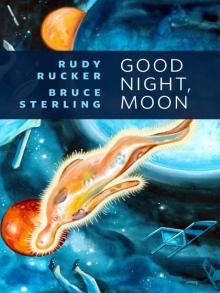 Good Night, Moon
Good Night, Moon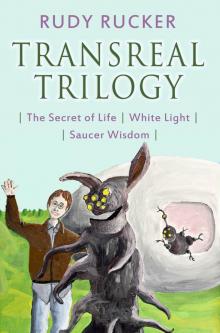 Transreal Trilogy: Secret of Life, White Light, Saucer Wisdom
Transreal Trilogy: Secret of Life, White Light, Saucer Wisdom Complete Stories
Complete Stories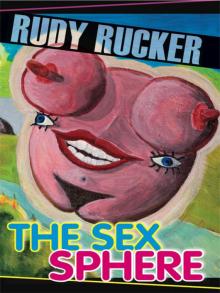 The Sex Sphere
The Sex Sphere Surfing the Gnarl
Surfing the Gnarl Software
Software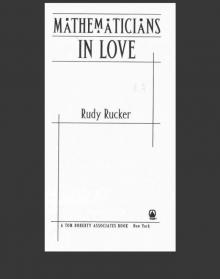 Mathematicians in Love
Mathematicians in Love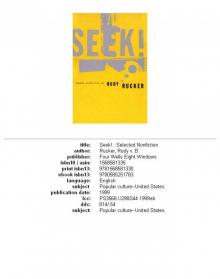 Seek!: Selected Nonfiction
Seek!: Selected Nonfiction The Secret of Life
The Secret of Life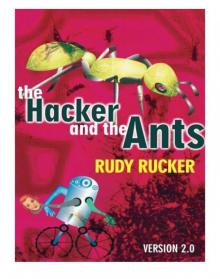 The Hacker and the Ants
The Hacker and the Ants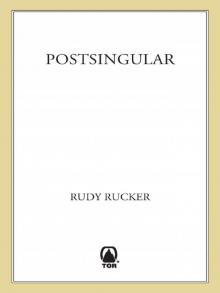 Postsingular
Postsingular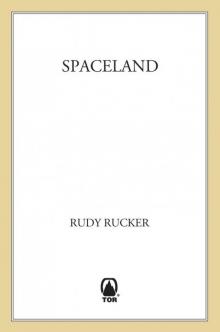 Spaceland
Spaceland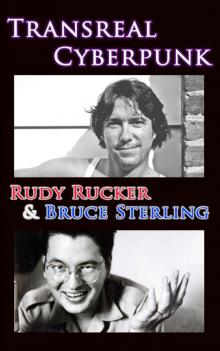 Transreal Cyberpunk
Transreal Cyberpunk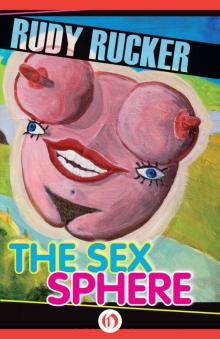 Sex Sphere
Sex Sphere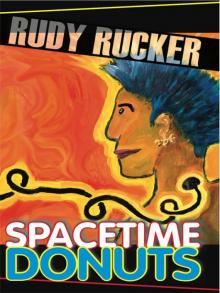 Spacetime Donuts
Spacetime Donuts Freeware
Freeware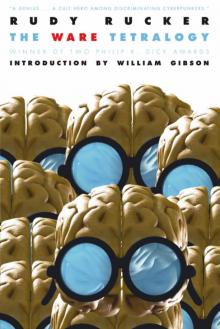 The Ware Tetralogy
The Ware Tetralogy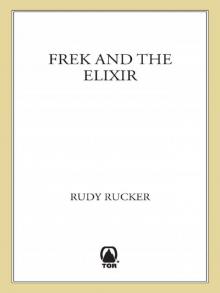 Frek and the Elixir
Frek and the Elixir Junk DNA
Junk DNA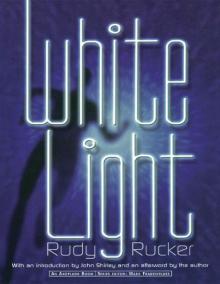 White Light (Axoplasm Books)
White Light (Axoplasm Books)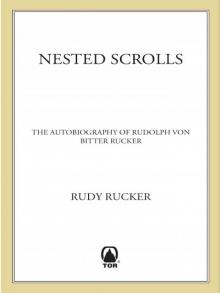 Nested Scrolls
Nested Scrolls Inside Out
Inside Out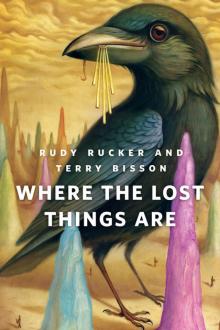 Where the Lost Things Are
Where the Lost Things Are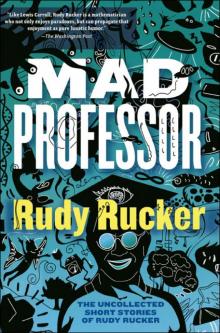 Mad Professor
Mad Professor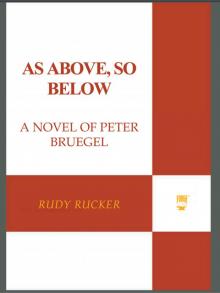 As Above, So Below
As Above, So Below Realware
Realware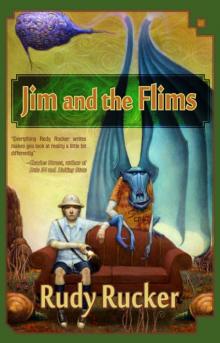 Jim and the Flims
Jim and the Flims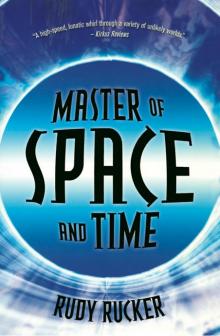 Master of Space and Time
Master of Space and Time The Big Aha
The Big Aha Hylozoic
Hylozoic